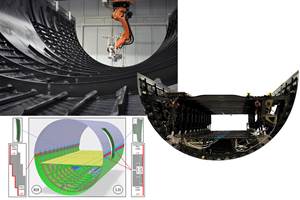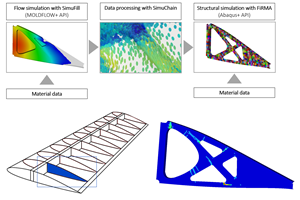Hydraulic, transfer press lines provide precision composite molding
CAMX 2024: Wabash MPI/Carver Inc. highlight the Genesis Series of hydraulic presses, as well as a line of transfer presses, engineered for compression molding of various materials.
Share
Wabash MPI/Carver Inc.(Wabash, Ind., U.S.) showcases the Genesis Series of hydraulic presses. These hydraulic presses are specifically engineered for compression molding of rubber, plastics and composites. They are also said to excel in laminating, bonding and pressure applications requiring precise ram control. Built for durability, the Genesis Series is designed to withstand 24-hour production floor use while maintaining the precision required for laboratory applications.
Genesis Series presses are available in models ranging from 15 to 150 t, with options for single or multiple openings. The advanced hydraulic system ensures rapid closing and opening speeds, which makes these presses optimal for working with modern molding compounds. Optional heated platens are offered with operating temperatures of 500°F, 800°F and 1200°F, catering to various specialized applications.
Wabash MPI/Carver Inc. also highlights its transfer presses, designed to provide precise molding for electrical components, medical products and other specialized applications. The companies offer a range of standard hydraulic and pneumatic presses with capacities from 0.5 to 1,000 t and platen sizes from 6″ × 6″ to 6' × 12'. The hydraulic system is said to produce faster closing and opening speeds, which can make it ideal for use with many advanced molding compounds. Additionally, Wabash MPI/Carver Inc. can custom-engineer press systems for specific applications, providing options such as heated and cooled platen packages in various configurations, eject systems, data acquisition, recipe storage and bladder and core pull circuits.
Related Content
-
SMC composites progress BinC solar electric vehicles
In an interview with one of Aptera’s co-founders, CW sheds light on the inspiration behind the crowd-funded solar electric vehicle, its body in carbon (BinC) and how composite materials are playing a role in its design.
-
Manufacturing the MFFD thermoplastic composite fuselage
Demonstrator’s upper, lower shells and assembly prove materials and new processes for lighter, cheaper and more sustainable high-rate future aircraft.
-
Composite bipolar plates provide 81% improvement to hydrogen fuel cell power density
Ultra-thin CFRTP plates developed by Hycco achieve a 7.5 kilowatt/kilogram power density, high durability for fuel cells in long-flight drone and heavy-mobility applications.
Related Content
SMC composites progress BinC solar electric vehicles
In an interview with one of Aptera’s co-founders, CW sheds light on the inspiration behind the crowd-funded solar electric vehicle, its body in carbon (BinC) and how composite materials are playing a role in its design.
Read MoreManufacturing the MFFD thermoplastic composite fuselage
Demonstrator’s upper, lower shells and assembly prove materials and new processes for lighter, cheaper and more sustainable high-rate future aircraft.
Read MoreComposite bipolar plates provide 81% improvement to hydrogen fuel cell power density
Ultra-thin CFRTP plates developed by Hycco achieve a 7.5 kilowatt/kilogram power density, high durability for fuel cells in long-flight drone and heavy-mobility applications.
Read MoreImproving carbon fiber SMC simulation for aerospace parts
Simutence and Engenuity demonstrate a virtual process chain enabling evaluation of process-induced fiber orientations for improved structural simulation and failure load prediction of a composite wing rib.
Read MoreRead Next
Wabash MPI/Carver PNP presses offer new model sizes, feature options
Customer capabilities for lab or production work have been expanded with 0.5-, 2- and 5-ton pneumatic press models and a variety of new customizable features.
Read More“Structured air” TPS safeguards composite structures
Powered by an 85% air/15% pure polyimide aerogel, Blueshift’s novel material system protects structures during transient thermal events from -200°C to beyond 2400°C for rockets, battery boxes and more.
Read MoreVIDEO: High-volume processing for fiberglass components
Cannon Ergos, a company specializing in high-ton presses and equipment for composites fabrication and plastics processing, displayed automotive and industrial components at CAMX 2024.
Read More







